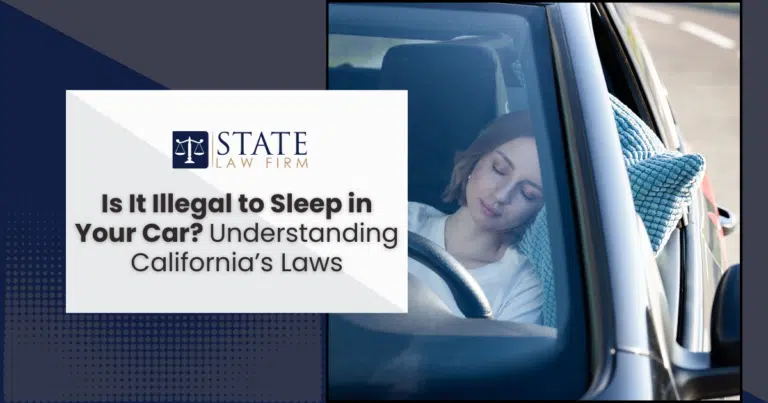In recent years, California’s escalating cost of living has significantly impacted housing affordability, leading many residents to seek alternative living arrangements. The state’s cost of living is 38% higher than the national average, with housing costs nearly double the national average.
Consequently, a growing number of individuals are turning to their vehicles as temporary shelters. In Los Angeles County alone, nearly 20,000 people now reside in cars, vans, or RVs—a 55% increase since 2016.
This trend raises important questions about the legality of sleeping in one’s car in California. Is it permissible under state law? Are there specific regulations that drivers should be aware of? Understanding these legal nuances is crucial, whether you’re a traveler seeking rest or someone facing housing challenges.
At State Law Firm, our team of dedicated Sherman Oaks car accident lawyers is committed to providing clarity on such pertinent issues. In this article, we will delve into California’s laws regarding sleeping in vehicles, explore the distinctions between temporary rest and vehicle habitation, and offer guidance on how to navigate these regulations responsibly.
By shedding light on this topic, we aim to equip you with the knowledge needed to make informed decisions and ensure compliance with state and local laws.
With California’s escalating cost of living, an increasing number of residents are using their vehicles as makeshift homes. Whether it is due to temporary financial hardship, a nomadic lifestyle, or convenience while traveling, sleeping in a car has become more common than ever.
However, just because sleeping in your car is a necessity—or even a choice—does not mean it is always legal. California has various laws governing where, when, and for how long you can sleep in a vehicle. Failing to follow these regulations can result in fines, towing, or even criminal charges in some cases.
California’s Specific Laws Regarding Sleeping in Your Car
While there is no statewide law outright prohibiting sleeping in a car, California does regulate vehicle habitation in various ways. The legality often depends on where you park and local city ordinances.
Key Laws to Know
- California Vehicle Code § 22651(a) – This law allows law enforcement to tow a vehicle if it is parked in a restricted area or poses a public safety risk.
- Local Ordinances – Many cities, including Los Angeles and San Francisco, have local laws banning overnight vehicle habitation in certain areas.
- Coastal and Park Restrictions – California state parks prohibit camping in vehicles outside designated campgrounds.
City-Specific Rules
- Los Angeles – As of 2022, Los Angeles Municipal Code 85.02 prohibits sleeping in a vehicle in residential areas between 9 p.m. and 6 a.m. but allows it in designated non-residential areas.
- San Diego – Sleeping in a car is banned between 9 p.m. and 6 a.m. on public streets and at all times near schools or residential properties.
- San Francisco – Many neighborhoods have strict no-camping ordinances, making it illegal to sleep in a vehicle overnight in most public areas.
Pro Tip: Always check local city ordinances before sleeping in your car. Rules can vary widely, and violating them can lead to tickets or towing. In Los Angeles, the current rule is outlined in LAMC §41.18, which restricts sitting, lying, sleeping, or storing personal property in posted areas near schools, libraries, shelters, and specific infrastructure.
The Difference Between Sleeping in Your Car and Living in It: What You Need to Know
There is a legal distinction between temporarily sleeping in a car and using it as a long-term residence. Understanding this difference can determine whether you are violating local laws.
Key Differences
- Sleeping in a car – Often considered legal if done temporarily, in a permitted location.
- Living in a car – This can be illegal in certain cities if the vehicle becomes a primary residence, especially in urban areas with anti-camping ordinances.
Some California cities strictly regulate vehicle residency, aiming to prevent long-term encampments in public spaces. However, these laws often disproportionately affect those experiencing financial hardship, a point of ongoing legal and policy debate.
Did You Know? Some organizations and churches offer designated “Safe Parking” programs for people living in their vehicles, providing a legal and secure place to park overnight.
Parks, Streets, and Private Property: Where You Can or Cannot Sleep in Your Vehicle
Understanding where you can legally sleep in your car is just as important as knowing the laws themselves.
Legal vs. Illegal Locations
Generally Allowed:
- Private property (with permission)
- Truck stops and rest areas (limited to eight-hour stays in designated spots)
- Campgrounds or RV parks
Usually Prohibited:
- Public streets in cities with anti-vehicle-habitation ordinances
- State and national parks outside designated campgrounds
- School zones and government property
Pro Tip: Many 24-hour businesses, such as Walmart or certain grocery stores, may allow overnight parking. Always check posted signs or ask management for permission.
The Consequences of Sleeping in Your Car Legally or Illegally
If you violate local laws regarding sleeping in your car, you may face legal consequences, including:
- Fines – Many cities impose fines ranging from $25 to $500 for violating sleeping-in-vehicle ordinances.
- Towing and Impoundment – Repeated violations may result in your car being impounded, adding costly towing and storage fees.
- Misdemeanor Charges – In extreme cases, violating vehicle habitation laws can lead to criminal charges, especially if other infractions (like trespassing) are involved.
- Safety Risks – Apart from legal issues, sleeping in your car can make you vulnerable to theft, extreme weather, or unsafe parking conditions.
If you have been cited or towed under these laws, it may be worth seeking legal assistance. Our team at State Law Firm can help you understand your rights and explore your options.
Tips for Safely Sleeping in Your Car If It Is Legal Where You Are
If you find yourself needing to sleep in your vehicle, follow these tips to stay safe and legal:
Best Practices for Car Sleeping
- Choose a safe location – Well-lit areas with security cameras or designated rest stops are best.
- Follow all posted regulations – Avoid restricted zones to prevent fines or towing.
- Stay inconspicuous – Use sunshades or curtains for privacy.
- Be mindful of ventilation – Crack a window slightly for airflow without making it obvious that you are inside.
- Have an emergency plan – Know where the nearest 24-hour gas station or police station is in case of trouble.
If you are facing legal trouble or have questions about vehicle habitation laws, State Law Firm is here to help. Our experienced attorneys can assist with disputes, citations, and legal issues related to your rights as a driver in California.
Know Your Rights, Stay Informed
Sleeping in your car may seem like a simple solution to an expensive problem, but California’s laws on vehicle habitation are complex and vary by city. Understanding these regulations can help you avoid fines, stay safe, and know when it is time to seek legal advice.
If you have been cited or need guidance regarding vehicle habitation laws, contact our team at State Law Firm. As a boutique personal injury law firm run by dedicated attorneys, we are committed to helping clients navigate legal challenges and fight for their rights.
For more legal insights and assistance, visit our Sherman Oaks car accident lawyer page or reach out for a free consultation today.


